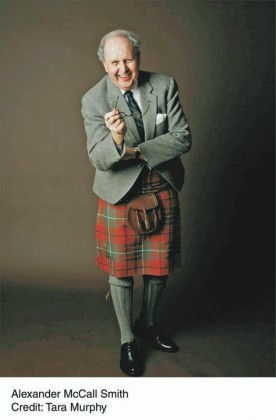COMMENT: Booking fiction star at nonfiction festival is hypocritical opportunism
 For the first time since it changed its focus to non-fiction in 2006, Litfest has opened the door to fiction – big-time fiction.
For the first time since it changed its focus to non-fiction in 2006, Litfest has opened the door to fiction – big-time fiction.
The 2012 version of the event – Oct. 17-28 at venues around town – will feature Alexander McCall-Smith, the author of over 50 novels, including the highly successful “No. 1 Ladies Detective Agency Series.” The program released this week also includes songwriter Dan Hill, journalist-pundits Noah Richler and Paul Wells, environmental writer Andrew Nikiforuk, 2012 Canada Reads winner Carmen Aguirre, CBC Radio mainstay Nora Young and others.
Litfest has invited fiction writers before, such as Robert Stone, Joseph Boyden and Todd Babiak, but those novelists were invited to talk about the non-fiction they had recently written, not to promote their novels. (Full disclosure: I’ve also been invited to participate in this year’s Litfest even though I’m primarily known as a novelist – and I’ve been asked by Litfest organizers to read from one of my work-for-hire non-fiction books.) But with a solo event at the Winspear Centre Oct. 23, McCall-Smith is the definite headliner here, probably the biggest name ever seen at the event.
Litfest organizers are keen to note that there’s no hidden agenda behind the booking of a novelist as their headline attraction.
“Well, first of all McCall-Smith doesn’t just write fiction. He’s a respected legal scholar and has written a number of textbooks and monographs,” said Litfest producer David Cheoros in an e-mail interview. “It certainly is outside of the nonfiction theme, but unless you see fiction and nonfiction as being against each other, it’s not against it.”
While Cheoros’s argument about McCall-Smith’s non-fiction is a stretch – like saying we go see U2 because of Bono’s humanitarian work – there really is no hidden agenda. What is going on here is a bit of hypocritical opportunism.
It should be noted that Litfest organizers did not actively seek out McCall-Smith. He’s touring Canada and the organizers of the tour asked the Litfest if they would like to invite him, a mixed blessing for the festival. Here is one of the world’s bestselling novelists, someone who would bring in the huge crowds that no Litfest author has been able to do since the festival started. But he’s the antithesis of almost everything Litfest stands for. Since 2006, Litfest supporters have been pretty adamant about their backing of non-fiction. There’s almost been a certain disdain towards fiction, its perceived popularity and the other literary festivals that focus on it.
For proof of this, check out the Litfest website under the heading: Why Non-Fiction. Instead of discussing their love of non-fiction and beauty of real-life storytelling, they link to a piece written by Ken McGoogan, a writer known for his excellent history books on Arctic exploration. McGoogan writes that he is “tired of listening to fictioneers read to me from books I can read myself”, and that save for the Litfest, Canada has “turned its back on literary non-fiction.”
He also notes that “we have become a nation of spectators, detached from our own history, our own issues, happy to leave engagement to others, while fawning over fiction writers, preferably come from faraway.”
So that’s the tone the Litfest people are going for when they explain their non-fiction route.
But in the end, Litfest couldn’t say no to someone like McCall-Smith. They realized that despite their non-fiction stand, people DO want to listen to fictioneers reading from books they can read themselves. They DO like novelists who come from faraway, and close. And that while the Litfest attendance numbers do rise a bit every year, there is no way they can match the impact and the audience level of other festivals like Wordfest in Calgary or the International Writers Festival in Vancouver without the presence of a few novelists. Poets, too. Those folks draw solid crowds for their cabarets which are loads of fun.
Hopefully, Litfest’s fling with fiction this year will make organizers realize that fiction can be their friend, not their enemy, and that all genres of writing can work together and create something more interesting and powerful for the most important people in the literary world: the readers.











